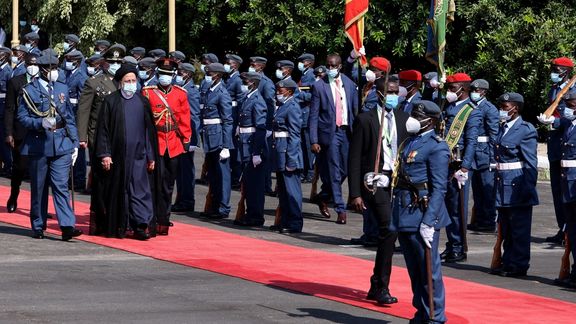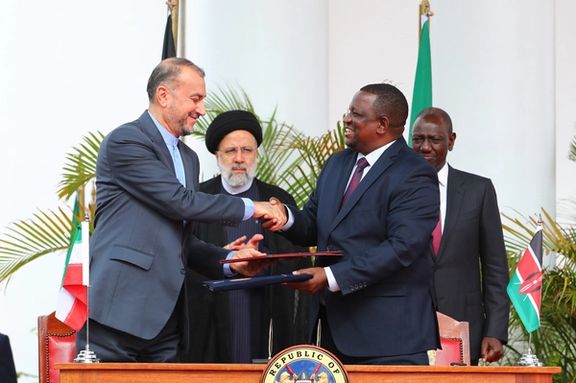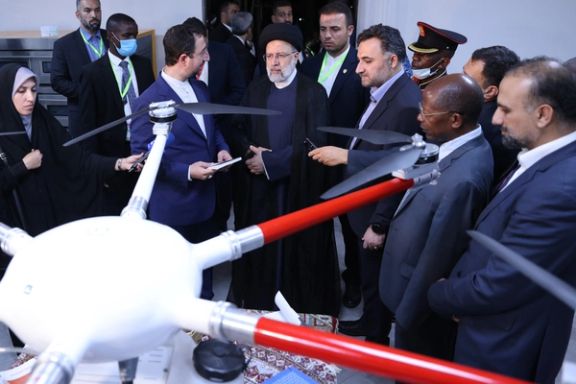Iran's President Visits Africa To Claim Some Success

Iranian President Ebrahim Raisi's tour of three African countries is hailed by Tehran as a "new beginning" in relations with the continent.

Iranian President Ebrahim Raisi's tour of three African countries is hailed by Tehran as a "new beginning" in relations with the continent.
Raisi received a red-carpet welcome from his Kenyan counterpart William Ruto on Wednesday as he arrived in the country on the first leg of his tour, a first by an Iranian president in more than a decade, presented as an effort to diversify economic ties in the face of crippling US sanctions. The last Iranian leader to visit Africa was Mahmoud Ahmadinejad in 2013.
Kenya's foreign ministry described Raisi’s trip as an opportunity “to review and re-energize bilateral relations for the mutual benefit of the people of the two countries."
According to Kenya’s President Ruto, “Iran agreed to boost Kenya’s pursuits in manufacturing, health and the blue economy through research and technology.” He added that his administration was “working closely with Tehran to facilitate the export of more tea, meat and other agricultural products to Iran, which will also act as a key entry point to Central Asian countries.”
As is customary in Raisi’s visits, Iranian and Kenyan ministers signed five memorandums of understanding covering information technology, fisheries, livestock products and investment promotion, with the Iranian president expressing hope that the bilateral ties would increase tenfold, without specifying a timeframe.

Claiming that raising the volume of trade exchanges 10-fold is within the realm of possibility, Raisi stated, "None of us are satisfied with the current volume of trade and the current economic exchange between countries."
Iran's foreign ministry has said that it expects trade with African countries to increase to more than $2 billion this year, up from an estimated figure of about $500 million.
Even if the higher figure was feasible, it would still be insignificant compared to the UAE's $50 billion and Turkey's $35 billion trade with Africa, which has $600 billion global trade. Iran's target represents less than one percent of that.
Alan Tofighi, a Paris-based activist, told Iran International TV that such claims by Tehran are unrealistic due to its lack of financial resources and international access to invest in African countries.
He believes this is why former president Hassan Rouhani never wasted his time with trips to African countries, as such visits only serve the regime’s propaganda. According to the pundit, Iran’s ulterior motives to have a presence in the continent can be “terrorist activities and procuring materials for its nuclear program, such as uranium, as well as promoting the Shiite ideology.”
The Iranian president arrived at his second destination Uganda later on Wednesday and is scheduled to visit Zimbabwe next.
In Uganda, Raisi signed four agreements with President Yoweri Museveni at his presidential palace in the capital Kampala, also saying that Iran stood ready to share its experience regarding a planned 60,000-barrel-per-day oil refinery.

“The West and the global arrogance prefer that countries export oil and raw materials and turn such materials into value-added products. Therefore, all our efforts in Iran are focused on preventing sale of raw materials,” Raisi said.
“Global arrogance” is a term coined by the Islamic Republic to refer to the United States, which it claims wants to subjugate Iran. Anti-Americanism is the ideological cornerstone of Supreme Leader Ali Khamenei's regime during more than three decades of his authoritarian rule.
“Western colonialism is after exerting pressure on free and independent countries through human rights issues and, today, it is exploiting human rights as a political tool and is putting pressure on independent countries through double standards,” Raisi said in a press conference with Museveni.
Morteza Kazemian, another political analyst, told Iran International that Raisi’s visit will bear no results as all the three African destinations of his tour are grappling with numerous economic and social crises. Neither Iran nor these African countries have anything to offer to each other, he added.
Jaber Rajabi, a political analyst and activist, also told us that given the growing isolation of the regime Raisi’s track record of human rights violations related to the mass executions in the 1980s, he does not have many places to visit. “Such trips are only for show,” he noted.